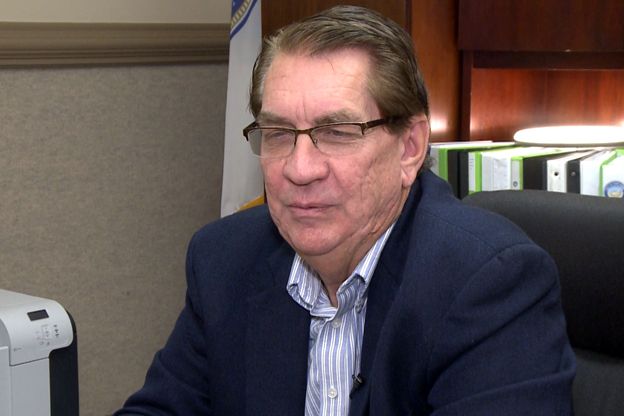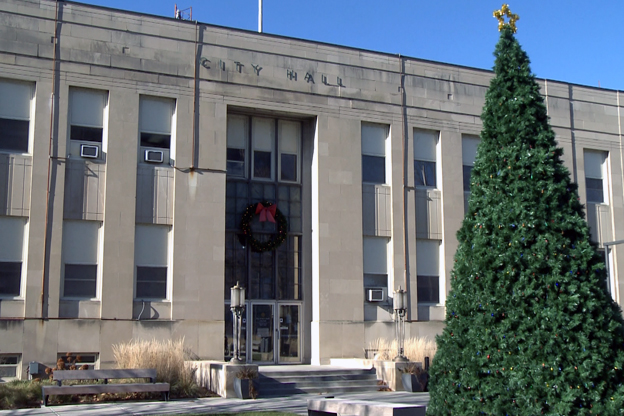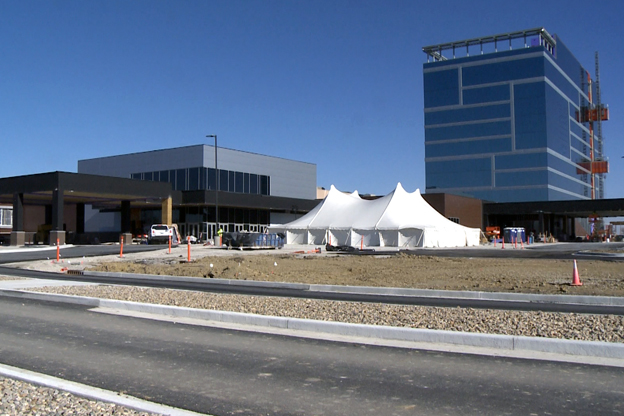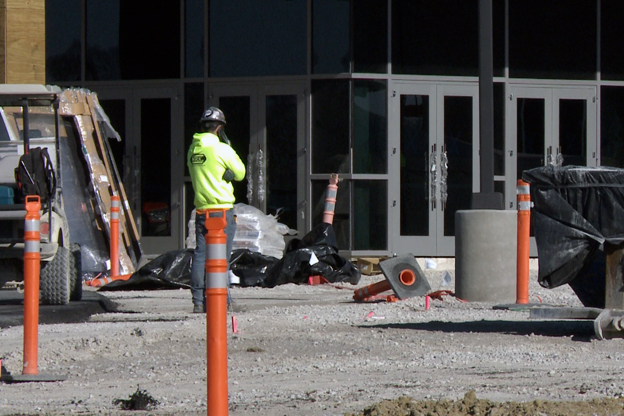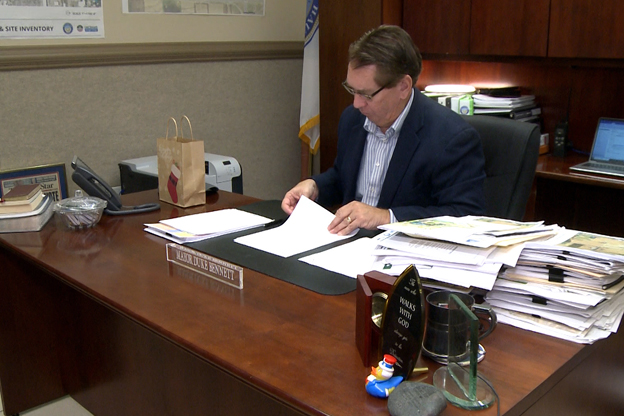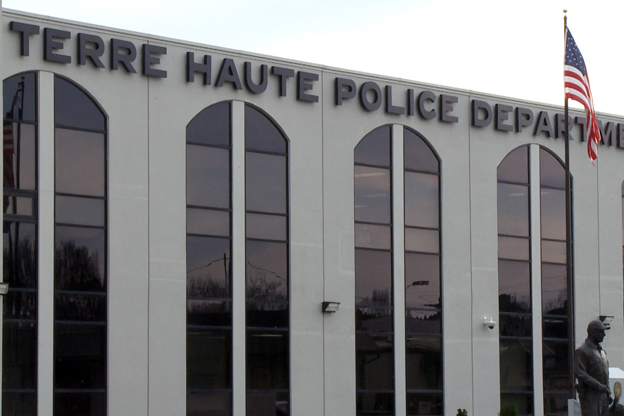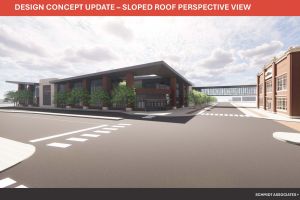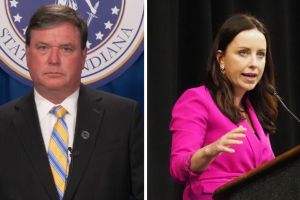Hello and welcome to ask the mayor on WFIU. I'm Joe Hren from WFIU, WTIU News. This week. We're joined one last time by Terre Haute, Mayor Duke Bennett. Hello and welcome. And as always, thank you so much for doing this. You've been a great sport on this show all these years. Hard to believe this started when I came aboard it was a live Call-in show. Way back when Yeah, and, Stan Jastrezbski was here at that point. I know there may have been someone even before that. That's who I remember. And we turned it into a feature on location show, which has been great for us as media to actually come to the city, see what you're doing? Go get video, take it back and do more of a web social media presence, which I think has gone well. Yeah,
Speaker 2
I get a lot of positive feedback. A lot of people watching Yes, yeah,
Speaker 1
great. But again, appreciate you doing this and kind of wrap up a few things here. I know, there's a lot on your desk before you leave office officially January 1, but talk about some of those things that you really kind of want to push through before you head out. You
Speaker 2
know, I think it's, it's been really important to me to have a good transition, you know, that doesn't always occur, you know, between administrations a lot. And I, every four years, I think about could this be, you know, the last time that I'm in this position, so I've thought a lot about it over the years. But I wanted to make sure we did that. And so as you think about leaving, yeah, I'm just doing normal business everyday right now and trying to provide information to the transition team. And, you know, just tying up all the loose ends, I guess, to make sure we leave everything in great shape. And so that's been a bit of a challenge, just because we're kind of accelerating the closing of the of the month, you know, when of the year so I feel really good about the projects that we have in process right now of getting them moved over to the new administration. We've talked to them about those. You know, we awarded a contract for Ray Park this week, as an example, that project will get started after the first of the year. And, you know, things like that we got community crossings grant recently. And so those things are laid out for next year, just a variety of things that we're trying to make sure there's a seamless transition on the things that are imminent, you know, are going to happen in the next couple of months, then there's the things that were will they fit into the priorities of the next administration. And so we're kind of working through those things now. And so our team has been meeting with members of their team. And, you know, it's just, you know, it's a bit bittersweet just because their projects, some of them I've been working on for years, and now they're getting ready to happen. That's a little frustrating for me, just because I wanted to see them through. But you know, that's the way it works. I want to make sure they stay alive, and they continue to be to get done really is the bottom line. So so far, it's been a really good transition.
Speaker 1
I know, there's so many things that are on your docket. But one of the things we've always talked about was housing, where were you leaving that?
Speaker 2
So you know, we've got our housing plan for Vigo County as a whole, we know exactly what our inventory is what our needs are. So over the next five years, I would expect somewhere, you know, between 750 and 1000 new homes, and whether that's single family homes or duplexes or multifamily housing to be built, we, you know, we made a commitment, we've received some ready grant funds, first of all, those have been expended now through working with Thrive West Central within the city and the county will put $5 million on the end of the pot to take this on to the next level. And so we want to incentivize builders, to build subdivisions, build single family homes, on empty lots in the city, wherever, whatever, but to meet that demand that we have with the new jobs that are coming in, and we have to have housing has to be a place for people to live. So it's been an important thing for us. The ARPA funds really helped us do some big things. And then I'm hopeful ready in the future, we'll provide additional funding down the road. So the goal here from a community perspective is to build more houses to support the needs today, but then meet those needs in the future. And
Speaker 1
when you talk about needs you think about in tech, the company that's coming in, over on this part of town, bringing in a ton of jobs, but also you're driving in I could see the casino really starting to take shape too.
Speaker 2
And they're hiring people and you know, they're they've got a lot of good paying jobs, too. People want to buy a house and live here, when the in tech group starts actually hiring staff once construction gets started and to begin that, that timeline, there's going to be a huge demand there. You know, 650 employees are all going to come from taro and Vigo County. So how do we meet that need? It's it's Getting making, you know, it's expensive to build a house right now, you know, everybody knows that everything, all the costs are up, interest rates are up. And so we had to find a way to narrow that gap to make sense to get these builders to build a lot of homes. And so I think it's going to be a great plan, it's going to roll out in the coming next probably 60 days. And hopefully in the spring, we'll start to see that construction happen.
Speaker 1
And we hear about the casinos coming. The casino money is coming. What do you mean? What do people mean when they said the casino money is coming. So there's
Speaker 2
local funds that we will receive from the revenues of the casino. So roughly 10% of their gross revenue will come back to the community in a different pipelines, if you will, the city of Terre Haute will get about half of that roughly $5 million of that just to go into the budget to be used for quality life. That's what we had proposed, from the beginning to pay more streets, do more sidewalks, fix up the parks, things that if you're not a gambler, you know, and you don't support the casino, that's okay. But you'll still benefit from this. And then there's another 5 million that kind of 3 million that goes into the local development agreement. And it'll be used for local projects also. And then a couple of million dollars split between several local entities. So if they meet their goals that they anticipate doing, there'll be roughly $10 million and a full year of operations. Obviously, that won't happen next year. But it should happen in 2025. To get that full $10 million coming back into the community that can be reinvested into quality of life quality of place.
Speaker 1
There's so many things I know you could talk about to about just being proud of your terms here in Terre Haute, he talked about the casino, the convention center. But we have to talk about something that you can't really put a plaque on. And that is balancing the budget. And after all of those property tax caps. Yes,
Speaker 2
I mean, we were one of the hardest hit cities in the state of Indiana. And that's still holding true today, we're having our biggest tax cap credits this year, and 2024 that we've had since 2009, we've found ways to get around that. But you know, that's almost $17 million, that would be coming to the General Fund had we not had the tax cap. So if you own a piece property in the city, you're saving $17 million, just for the city of taro. I didn't include all the other taxing entities. So it's good for the taxpayer. But it makes it difficult to deliver services. And so as I came into office, you know, there was a lot of spending done prior to me coming in, we had a lot of bills to pay a lot of things to get in place in a year, because in 2009, those caps started. And you know, they're here forever. So everybody has to live with them. But you hear school corporations, cities and counties all the time talking about it's still impacting us, because you have some growth, but then the caps kick in and you don't get all that growth. So it's been frustrating that we did that we know we've next year will be the ninth straight year of a balanced budget for the city of terror. And I don't even know if that's ever happened before. We've got cash reserves. We're in a great spot to hand it over to the next administration. We're on very, very solid financial ground.
Speaker 1
Any other items that you'd like to mention that, you know, really stick out?
Speaker 2
You know, I think getting the police station done was big, you know, we needed to do that. And we ran a temporary facility, if you will, you know kind of when I came on board, and we milked that as long as we could. But we got this brand new, tremendous facility now, that state of the art it's one of the best anywhere around so we're very proud of that. Getting the wastewater treatment plan upgraded Yes, it cost a lot of money to do that. But it put us in compliance with the EPA, which was really important. It was something else I inherited when I came in, you know getting the overpass done on Margaret avenue that should have been done. 50 years ago. We got that done. We have another one coming to 13th and Eighth Avenue that's fully funded. That'll get built hopefully to construction will start in 2025. It's an MDOT driven project but $26 million worth of you know Overpass, very proud of that. Very proud of just what's happened downtown. The improvements are you know, you mentioned the convention center but you know, we have a new federal courthouse and ISU has done things a new parking garage, I and of course ISU Hold'em center besides the School of Business, but you know, we've had several 100 million dollars worth of investment downtown in the last 20 years. That's been been amazing. So it's like, you know, you put plans together some things happen faster and happen on the timeline. You want them to happen. Other things take a little longer. But just stepping back and looking at it. I think we've accomplished a lot. 16 years. I'm extremely proud of what we've done. The team I've had internally we've had very little turnover on our department heads or any other position. So that's been helped us as the city of taro to move forward. But all the community partners you know, Taro, DDC, in the chamber, you name all the rest of it. don't leave anybody out. But working with the county, I mean, we've got the best relationships we've ever had in our history. And that's why you get things done when everybody's working together for common goals.
Speaker 1
Yeah, I can't say that. In many other places,
Speaker 2
it wasn't like that here. I get it, you know, and I hear those stories.
Speaker 1
You know, a lot of what you did to go into the Statehouse or the lobby a lot, especially with that, not getting a business, personal property tax. What's something that you wish, you know, as you leave this office that the state would do more of, for local cities just give
Speaker 2
us more freedom to work with our budget and our dollar. So you know, all a lot of the revenues have very restrictive uses, you can only use it for this, you can only use it for part of this can be used for that. And part of it can be user. So there's a lot of rules to all those funds. Well, it really, you know, limits the ability to do some things, if they would just give us more freedom to spend those dollars, you know, locally, they approve our budgets anyway, so they know what we're spending it on. But to give us a little bit more local freedom, I love that local control, you know, that hometown rule? So more of that, you know, I don't like more rules and more restrictions, because somebody makes a mistake somewhere. You know, let's don't change the laws to deal with one problem somewhere here or there, when the majority of us are following the rules and doing it right. Just give us that local control. Would
Speaker 1
you learn the most about Terre Haute residents from being mayor?
Speaker 2
Hmm, um, you know, I think that a lot of times people don't understand how local government works, they get confused, who's responsible for what and know the limitations we have based on the law, you know, when it comes to like housing, you know, a house that's been condemned and how long it takes to get it condemned, and how long it takes to get torn down. That's one that was a very repetitive, like weekly kind of an issue we dealt with. You know, we, we've always done everything by the book, we do it by the local ordinance, or by state law. And sometimes that's a little frustrating for people. And they just don't want to hear that they just want the problem resolved. And I get it, we've worked really hard on that customer service aspect, the 311 system was another great thing that we implemented to make it easier for people to deal with the city. But it's really just educating, informing, you know, keeping information flowing out to the public, to make sure they understand what we can and can't do and make sure we follow through with it. So that's probably the biggest, you know, kind of pain is that a lot of times people have a complaint, they just want it fixed immediately. And they don't understand why you can't do it today.
Unknown Speaker
What will you miss the most solving
Speaker 2
problems, those same kinds of things. You know, I had a guy walk in here yesterday, and he's got an issue with a neighbor. And, you know, we made some progress on it already today. But it's like, being able to help somebody because you know, when they come, and they want to share something with the mayor's specifically, it's a pretty big deal to them, it's really already reached the highest point. And I love being able to solve problems. And that's really what this job is. It's a constant. I mean, people don't call up and say, Hey, you're doing a great job, they're calling up to tell us, they've got an issue they want to deal with, you know, we get roughly 200 contacts a day, whether it's Facebook page, a phone call an email letter, I mean, I receive letters still. And some of those are easy to resolve. And some of them are more complex. And so just making sure that we're responsive, and we do everything we can to solve that problem. That's what's been the most important thing to me.
Speaker 1
Whether that be or your best piece of advice for mayor elect sack been,
Speaker 2
you know, anybody that gets elected, you know, you always think about, Okay, those are my voters, but there's a lot more people than what vote out there. And you just have to remember that no matter how small it might seem, you know, the problem in those big scope of things. It's really important to those people until that person making that complaint. And they need to get the same level of treatment as you know, the biggest corporation here or ISU, or any you just name anybody you want. Everybody gets that level playing field from this administration. And I always encourage anybody that gets in a job like this to make sure that you give everybody equal, you know, given the same attention.
Unknown Speaker
So January 1, do you have any plans yet?
Speaker 2
No, not yet. I started sending the resume out last couple of weeks. And so you know, I've had a few conversations with people but I have no set plans as of yet. Hopefully something will happen soon and I'm ready to go to work on January 2, I'm fine with that. I just don't know what that what the next steps gonna be what the future holds and so hopefully it's some way to contribute to make you know, West Central Indiana and Tarrant, Vigo County, a better place.
Speaker 1
So, that was all I had, but I would love for maybe, you know, a final word from from the mayor.
Speaker 2
So I would say you know, I really enjoyed this job. It's been Got a lot of long hours, no question, you know, seven days a week, losing three police officers, you know, when a firefighter, three police officers have been shot and killed, firefighter diving, dying of COVID, those are tough, you know, those were tough times. But those are, you know, things that you just have to deal with sometimes when you're the mayor and as a community, and I think just rallying around those downtimes helped us, you know, reach some really high lofty goals that we I set. And so when you kind of look back across it, you know, we've had a lot of things that have happened that who would have ever thought, I mean, you just didn't, you can't write a script for this kind of a job. And so every day has been different. I've enjoyed that. I enjoy being around people. I love going in Annapolis in DC and doing that side of it representing Taro. And so I think it's really important for this whoever's in this job to make sure they remember that, that you know, you work for the people, and the people have a lot of needs, and you got to make sure you meet those goals. And, you know, and I feel like we've done that I really feel good about the last 16 years. And as I mentioned earlier, the team I put together here, and you know, he's keeping some of them. So that's that says, a lot harder, do we move Terre Haute to the next level, that's kind of the next step in the process. And I just, we got to continue to do that. We got everybody all hands on deck. And I believe that'll happen. And, you know, I've enjoyed every moment of this. It's just been, you know, lots of highs and lows. And at the end of the day, I go home every night I sleep well, and I get up the next morning and tackle it again. And I think that's important for anybody in this role to do that. And I feel strongly about the progress we've made. And, and I'm just feeling good going out. You know, I just wish nothing but the best for everybody here in the future.
Speaker 1
Can you put a finger on maybe one thing? And maybe it's a hard question, but that has changed in terms of the 16 years of being mayor? Is it housing HUD may have priorities really shifted from 16 years ago, a little
Speaker 2
bit. I mean, we weren't talking about housing 16 years ago, the same way we are today. I mean, it is a huge, huge demand. But we're talking about daycare, the accessibility for that. And we're talking about workforce development things more than we ever have, because of the changing workforce needs out there. So you kind of look back and you say, okay, infrastructure is always important. But all those other things are important too. Because if you don't, if the place isn't clean, if it isn't safe, if you aren't investing in yourself, and that's been difficult with the property tax cap, so then all of a sudden, you start getting the benefits of all these economic development deals, and everything comes into the community. And it's kind of like, okay, so now we need daycare, we need housing, we got to improve the workforce. It's all those things that you couldn't invest that much in because you knew it was going to hit eventually. But it all kind of came together at the same time. So I think we're in a great spot from that perspective. And, you know, you got to have a place that people want to come to and move to to take these jobs. And so we've set the stage for that. And it's happening every day. And we just got to continue that. And
Speaker 1
I've seen that through the years during the show, even up with Greg goodnight in Kokomo amenities, it was just so important to every man
Speaker 2
to stand out. Yeah, you have to do something to make yourself why would somebody want to move to Terra? Why do you get you come and look at it, you're thinking, Yes, places got it going on. If you don't have that, they're not going to do that they're gonna go somewhere else. And so you can't fill the jobs in, which leads to less economic development, because the word gets out that there's no housing, there's nothing to do whatever. And so we've changed that whole conversation here locally. Well,
Speaker 1
before we go now that we're no longer on a business level, we do want to leave you with a little something from the station. Okay, take a look there. We have a we have an WFIU hat. Yeah, that's great. That's great. We have a mug from our Indiana newsdesk that you've been on many times, many times. Yeah, absolutely. Of course, the audio is always aired on WFIU you just a little magnet in there too. But okay. And
Unknown Speaker
thank you for all the years. I
Speaker 1
know that doesn't make up for all the Oh no, it's great. How the questions we've asked over the
Speaker 2
years. You've been great. So thank you.
Unknown Speaker
Thank you. Appreciate it.







